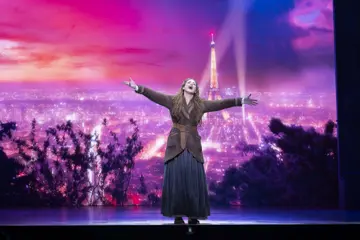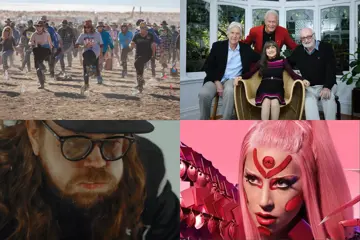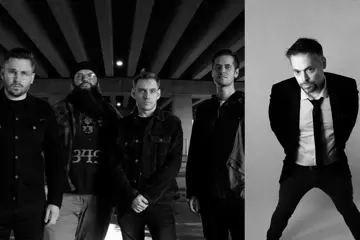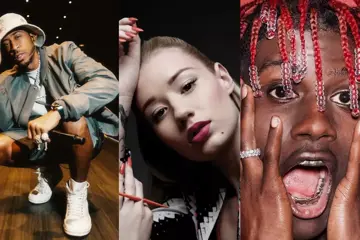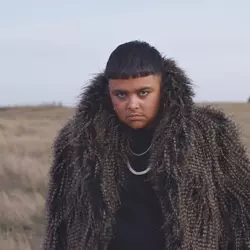 Mo'Ju
Mo'JuMojo Juju thinks in stories. She admits to being in possession of a hopeless romanticism, and this in combination with her constant absorption of film, literature and old music (a staple diet of traditional blues, old rock'n'roll and classic jazz: Luis Jordan, Noni Harris, Billie Holiday, Cab Calloway), and a life frequented by the sorts of people you can steal pieces from, means she sees the world through a certain cinematic lens. She thinks in stories and the stories become songs, populated by gangsters and truck stop lovers, hard drinkers and bar room dancers, gamblers, fugitives, dreamers.
“Some of them are real,” Mojo Juju says of her characters. “Some of them are completely fictional. Some of them are based on myself and people I know, and some of them are based on who I'd like to be, who I'd like to know. I'm not going to tell you which is which because it's heaps more interesting if you don't know.”
Many of her fans got to know her when she was involved in an entire band of these very sorts of characters: a sprawling, revolving seven-piece freakshow called Mojo Juju and the Snake Oil Merchants. There was the skinny saw player, the giant orange-bearded double-bassist, burlesque dancers, accordions, trumpets, banjos, clarinets and horns. They released two albums, played all manner of festivals and gigs, won small but intense groups of fans in every capital city, then parted ways in 2011.
“With the Snake Oil Merchants, it was always a big party,” Mojo Juju says. There was always eight of us with loud instruments, and no matter what you did it always ended up being loud. And a lot of fun,” Mojo Juju says. “But for me, I just wanted to go out on my own and I wanted to explore, dynamically, a lot of different places. I wanted to focus on the songwriting and the storytelling.”
Don't miss a beat with our FREE daily newsletter
Going solo has been quieter, but it has afforded Mojo Juju a number of freedoms: the freedom to fit into a single vehicle with your touring band, for example. Namely, though, it has been creative freedom and a change in dynamic. “With the Snake Oil Merchants, the whole process was very collaborative. Even though I was writing the bare bones of the song alone, it would always end up being so very different to how I had envisioned it once seven other people had had their way with it. Everyone was coming from a different place in terms of their musical knowledge and what they had to offer. In that respect it was fun and it was exciting because you never know exactly where it's going to end up.”
These days, the buck stops with Mojo Juju. As glorious and exciting as that is, she doesn't deny that going solo can also be a deeply nerve-wracking experience. There's a particular type of trust she's needed to develop in her own creative abilities, in her gut instincts and the decisions they lead her to make, without the regular cross-check that comes with a collaborative band. “There's no one to argue with,” she says. “The solo nature of it is when it comes back to that final decision and you're the only one there.”
The other freedom, the freedom to create her own dynamic, has allowed her to play with the ways she interacts with an audience. There would be points during the Snake Oil Merchant shows where the majority of the band would leave the stage, and Mojo Juju, alone in a single spot, would sing the slower, darker numbers. These were the tales of heartbreak and longing, the sinister slow dances. It was a complete shift in dynamic and a taste of what was to come with her solo material.
“[With the Snake Oil Merchants,] I was used to just being able to just grab people's attention immediately with the sheer volume of what we were playing as well as the spectacle of what was happening on stage,” she says. “Going out on your own, I think there's something that is quite powerful about that. It's being at the opposite end of spectrum – it carries the same kind of weight. You have to work a little bit harder as an individual, but people listen in a different way. Because it's so intimate, it's almost more captivating in some respects.”
She also has to be careful about how she picks her venue. “When I'm touring with a band, we get to do a certain type of venue. When I'm touring on my own I do a different type of venue and I have a different relationship with the audience. You're having a different conversation and you're having a different interaction. It is, by all means, just as powerful and just as fun.”
Mojo Juju released her first self-titled solo album last year, and she's been touring it on and off since. Right now, she's engaged in her last tour for the year, ahead of a longer solo tour though Europe with her brother. This sort of rapid succession touring, this constant transience, is the norm. While most bands have an easily-discovered geographical context tacked onto them wherever they go, Mojo Juju has no solid hometown or base; the more people try to place her into some geographical context, she explains, the more she tries to defy it.
“I don't really think of myself as from anywhere,” she says. “I've probably lived in Melbourne longer than anywhere, and I always come back to Melbourne, but I feel like I've got a lot of different homes.” She cites Sydney and Newcastle among these, but it seems like she spends more time on the road than off it, and has done for most of her life. Growing up with an itchy-footed ambulance officer and SES employee for a father meant that, by the time she hit high school, the number of places she had lived had hit double figures. “Like, we weren't itinerant but... we moved pretty consistently.
“It's not even about the place,” she continues. “I think for me, I write a lot while I'm in transit. I've written so many songs when I'm on trains and planes and buses and in cars. Just in that time and place where you're reflecting on where you've just been and where you're about to be. I think that's most interesting because all of the sudden you're just you, without the context of the space that you're in. It's much more silent and you're reflecting on the coming and the going.”




